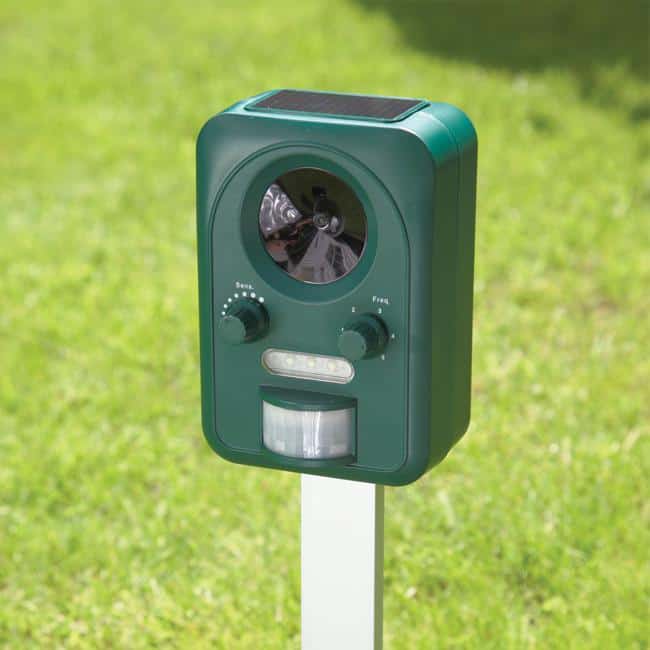Are you an avid gardener or pet owner struggling to keep feral cats from entering your yard and home? If so, then you might have heard about ultrasonic cat repellers.
These ultrasonic cat repellents use high-frequency sound waves that humans can’t hear but cats supposedly hate – but do these devices actually work as advertised?
In this piece, we’ll explore the mechanism of action behind these ultrasonic devices, why felines don’t take kindly to them and whether or not they can be effective with mature cats. So let’s dive in and find out: Do ultrasonic cat repellents work?
What are Ultrasonic Cat Repellents?

Ultrasonic cat repellent devices emit high-frequency sound waves to deter cats from entering a garden or home. High-pitched noises that are undetectable to the human ear, yet audible to cats and other animals are emitted. The high pitched noise is designed to scare away the cats without causing them any harm.
How do they Work?
As the name suggests, these devices when triggered emit an ultrasonic sound at frequencies which range from 20 kHz up to 65 kHz, depending on the model of device used. The range of 20KHz to 65KHz is used so as not to be heard by human ears but still audible for cats and some other animals.
Upon the area where an ultrasonic cat repellent has been placed, it will detect their presence via a motion sensor and the high pitched tone will scare the cat away.
What Sounds Do They Make?
An ultrasonic cat repeller typically makes a hissing noise or short burst of static-like noise which has been specifically designed to be unpleasant for cats while being inaudible for humans.
Some models come with adjustable options, allowing you to select the type of sound emitted when motion sensors are triggered or manually activated through remote control.
An Ultrasonic cat repeller can be a viable solution for keeping cats from your garden.
Recap: An ultrasonic cat repeller emits a high-frequency noise wave that is inaudible to humans but audible to cats, producing unpleasant noises intended to scare them away without causing harm.
Why Do Cats Hate the Noise of an ultrasonic Cat Repellent?
Apart from the noise being uncomfortable for them, fear of the unknown is the main reason why cats don’t like them. They don’t know what’s causing the strange noise or where it’s coming from, so they feel threatened and scared by its presence in their environment.
This fear can cause them to stay away from areas where these devices are installed, making them an effective way of keeping cats out of your garden or yard without harming them in any way. This is why they are a popular cat repellent.
The effectiveness of ultrasonic cat repellers on older cats is contingent upon a number of factors, such as actual age and hearing loss due to aging or illness. Older cats may have difficulty perceiving higher frequencies since their ears are not as sensitive anymore; thus, an ultrasonic device might not be able to repel them effectively if their auditory capabilities have been compromised over time.
Furthermore, some elderly felines may be familiar with certain noises and no longer find them alarming or disagreeable; consequently, even if an ultrasonic apparatus works initially on these cats, its efficacy could diminish gradually when used consistently in the same area without any changes in frequency or strength levels.
For this reason you should move your device around every week or two and if it’s adjustable, change the frequency regularly as well.
Overall, cats may find the sound of ultrasonic cat repellents unpleasant and even frightening due to its frequency, unfamiliarity, and fear of the unknown. Though this tactic may be successful in deterring cats from gardens or yards, it is imperative to consider whether its efficacy extends to elderly felines with hearing loss prior to implementation.
Recap: Ultrasonic cat repellers can be effective in keeping neighbourhood cats away from your garden or yard, but their effectiveness may vary depending on the age and hearing capabilities of the cats.
Will Ultrasonic Cat Repellers Work on Older Cats?

Age and Hearing Loss in Cats:
Much like ourselves, when a cat gets older their hearing can become impaired due to a variety of factors. Damage to the ear drum, middle ear and degeneration of the auditory nerve can all lead to hearing difficulties in elderly cats.
Additionally, cats may develop age-related deafness resulting from degenerative deterioration of the auditory nerve. All these conditions can make it difficult for an older cat to hear ultrasonic frequencies emitted by repellers.
Factors that Determine Effectiveness:
The effectiveness of ultrasonic cat repellent devices on older cats depends on several factors including how severe their hearing loss is and what frequency range they are able to detect. Some studies have found that cats with milder forms of hearing impairment were still able to detect some higher frequencies while those with more severe impairments could not detect any sound at all from the device.
If a cat has been exposed to similar sounds before such as alarm systems or other electronic devices, they may be less likely to be deterred by an ultrasonic repeller than one who hasn’t had this experience before.
If one of the offending cats entering your yard is triggering your device yet showing no reaction to the noise, try adjusting the settings to a different pitch. If that doesn’t work he may have come up against these types of device before so isn’t scared away by it.
When this happens you should consider installing a water cat repellent such as the Hoont Cobra.
Recap: Ultrasonic cat repellers may not be effective for cats with hearing loss, as the severity of their impairment and prior exposure to similar sounds can determine its effectiveness. Pet owners should consider their pet’s individual needs before deciding on a solution.
Conclusion
In summary, ultrasonic cat repellent devices can be an effective way to scare cats away from gardens and other areas you’d rather not have them in. While it is true that cats can hear the noise made by these devices, they do not like it and will usually stay away from the area where the sound is coming from.
Nonetheless, for cats of an advanced age, their auditory perception may not be sharp enough to detect the noise produced by ultrasonic cat repellers. Therefore, if you have an old cat in your neighbourhood or home, this method may not work as effectively as with a younger cat.
Ultimately though, whether or not ultrasonic cat repellents work for you depends on how well they fit into your particular situation.
Are you tired of neighbourhood cats taking over your garden and causing a mess? Do you want to keep them away but don’t know how? Or maybe you have an indoor cat that needs special care. Don’t worry, we’ve got the perfect solutions for all these problems!
With our comprehensive guide on ultrasonic cat repellents and other cat deterrents, tips on caring for indoor cats and more – it’s time to take action now! Take back control of your outdoor space – start today!





